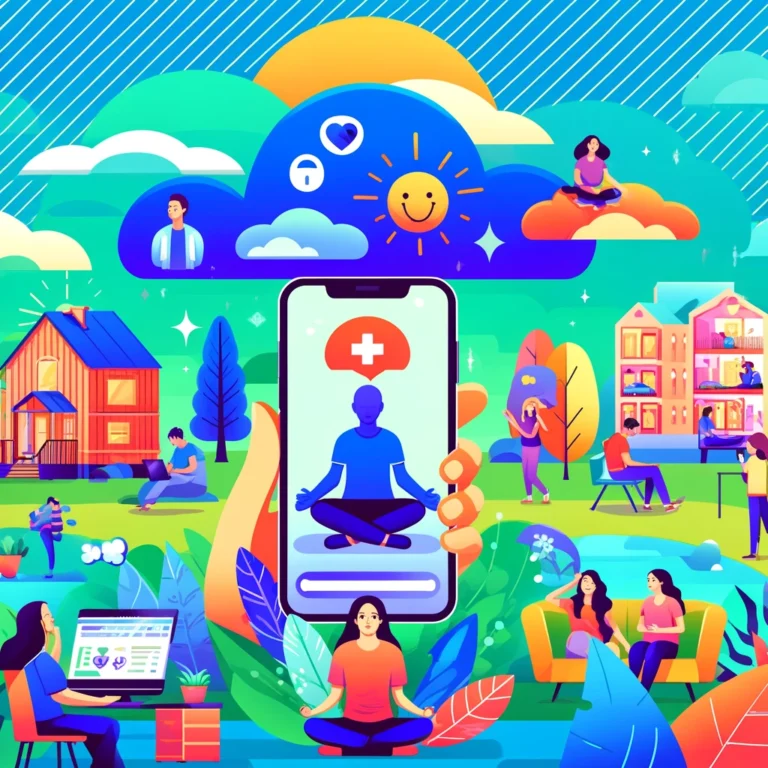Mental health awareness has significantly increased in recent years, and with it, the demand for accessible mental health resources. The rise of mental health apps is transforming how individuals manage their mental well-being. These digital tools offer various features, from cognitive behavioral therapy (CBT) exercises to mindfulness practices and direct access to professional therapists. This article explores the benefits and challenges of mental health apps and their role in promoting mental health.
Benefits of Mental Health Apps
1. Accessibility and Convenience
Mental health apps provide easy access to resources and support, making it convenient for users to engage in mental health practices anytime and anywhere. This accessibility is particularly beneficial for those who may have difficulty attending in-person therapy sessions due to time constraints, mobility issues, or geographical barriers.
2. Cost-Effectiveness
Compared to traditional therapy, mental health apps can be a more affordable option. Many apps offer free basic versions with the option to upgrade to premium versions for additional features. This cost-effectiveness makes mental health support more accessible to a broader audience.
3. Privacy and Anonymity
For individuals who are hesitant to seek help due to stigma or privacy concerns, mental health apps provide a sense of anonymity. Users can explore mental health resources and seek support without the fear of being judged or exposed.
4. Diverse Features and Personalized Support
Mental health apps offer a wide range of features, including mood tracking, guided meditations, breathing exercises, and CBT techniques. Many apps also allow users to set personal goals and track their progress, providing personalized support tailored to their needs.
5. Continuous Support
Unlike traditional therapy, which typically occurs at scheduled intervals, mental health apps provide continuous support. Users can access tools and exercises whenever they need them, offering ongoing assistance between therapy sessions or as standalone support.
Popular Mental Health Apps
1. Sanvello
Sanvello focuses on CBT principles and offers health and goal tracking, mental health exercises, and a community feature for peer support. Studies have shown that Sanvello can reduce symptoms of anxiety and depression, with effects lasting even after users stop using the app.
2. BetterHelp
BetterHelp connects users with licensed therapists through text, phone, or video calls. It is one of the largest therapy platforms, offering flexible communication options to suit different preferences and schedules.
3. Headspace
Headspace provides guided meditations, mindfulness practices, and sleep aids designed to improve mental well-being. The app aims to make mindfulness accessible and easy to integrate into daily routines.
4. Calm
Calm offers a variety of resources for relaxation and stress reduction, including guided meditations, sleep stories, and breathing exercises. It is designed to help users manage stress and improve their overall mental health.
Challenges and Considerations
1. Efficacy and Evidence-Based Practices
While many mental health apps offer helpful tools, not all are backed by scientific research. It is crucial for users to choose apps that are evidence-based and have demonstrated efficacy through studies and clinical trials.
2. Data Privacy and Security
Mental health apps collect sensitive personal information, making data privacy and security paramount. Users should ensure that the app they choose complies with privacy regulations and has robust security measures in place to protect their data.
3. Integration with Traditional Therapy
Mental health apps are not a replacement for professional therapy but can complement traditional treatment. It is important for users to integrate app-based support with in-person therapy when needed and consult with healthcare professionals for comprehensive care.
4. Potential for Over-Reliance
While mental health apps provide valuable support, there is a risk of over-reliance. Users should balance app usage with other forms of self-care and seek professional help if they experience severe or persistent mental health issues.
Mental health apps are revolutionizing the way individuals access and engage with mental health resources. By offering convenience, affordability, and personalized support, these digital tools play a crucial role in promoting mental well-being. As the demand for mental health resources continues to grow, the development and improvement of evidence-based mental health apps will be essential in providing effective and accessible care.

